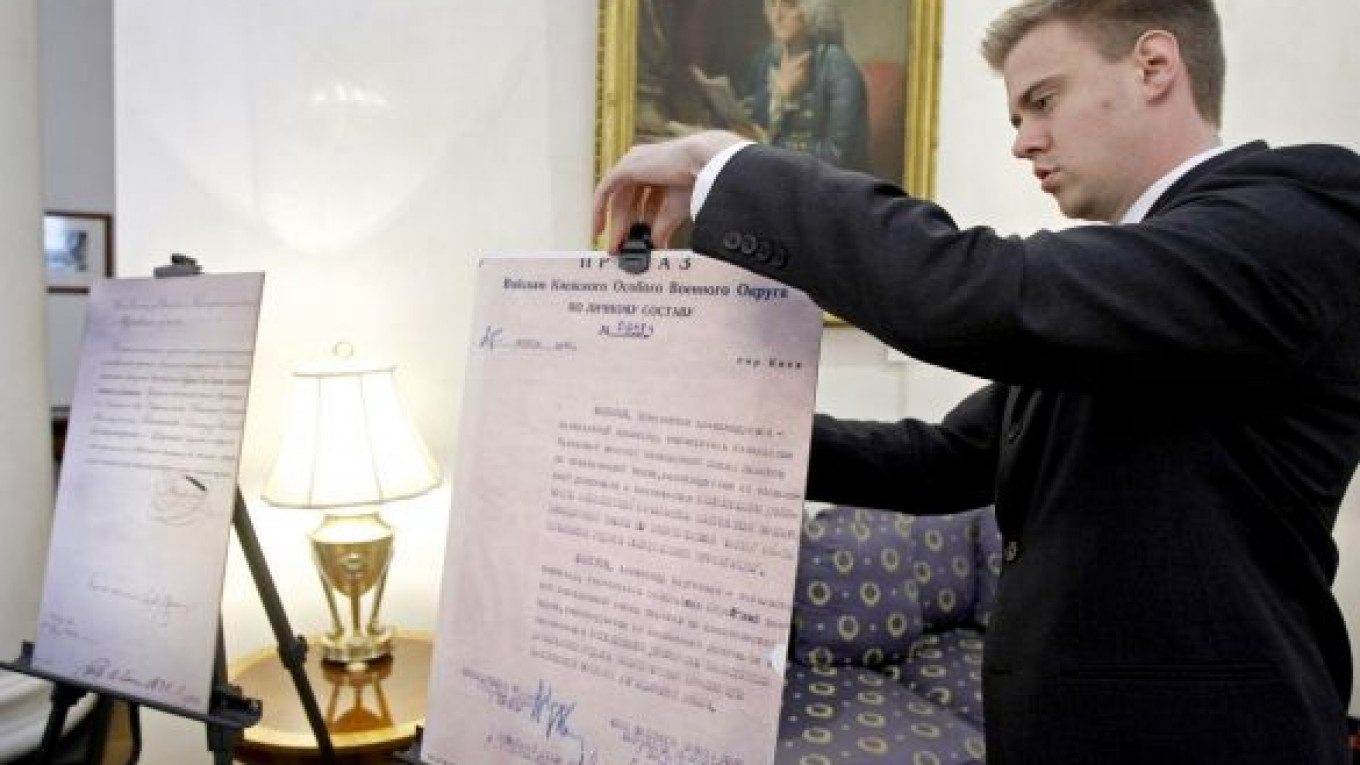The U.S. ambassador’s residence was the setting for a historic ceremony to mark the return of 21 valuable historical documents to Russia.
The documents returned are from a number of prominent Russian historical figures and span three centuries.
Among the documents returned is a decree by Catherine the Great to divide command of forces in Poland as well as an award and a decree by Tsar Nicholas II and orders and appointments by the Soviet Marshall Georgy Zhukov. The oldest of the documents dates to 1733.
“These are priceless documents,” Andrei Busygin, deputy culture minister, said during the ceremony Friday. “We’ve been asked which is the most valuable and how much [the items] are worth. But that’s impossible to answer. Their value can only be judged on another level — it’s not just monetary.”
The return of the documents is the result of cooperation between U.S. Immigration and Customs Enforcement and the Russian Federal Service for the Protection of Cultural Heritage.
Among those returned is a report marked “Top Secret” from 1932 signed by Marshall Vasily Bluykher that discusses the reconstruction of Soviet military airfields. The signatures of Lenin, Trotsky, Stalin and Khrushchev can be found on some of the documents.
The theft of art and historical documents has long been a problem in Russia, with the chief of police in 2002 declaring that valuable art was being stolen “to order” by organized crime for foreign dealers. Putin ordered efforts to inventory the art being kept by Russian museums in 2006 — after St. Petersburg’s State Hermitage Museum announced that more than 200 documents, with a value of $5 million, had been stolen over a period of as many as 30 years.
Officials from the Russian State Archive say many exploited the situation in Russia at the start of the ’90s “to take whatever interested them.” Russian authorities have been seeking the extradition of the Russian antiques dealer Vladimir Feinberg from Israel in connection with the theft of the documents.
The documents, some of which could be worth tens of thousands of dollars, were seized from five U.S. auction web sites last year by U.S. Immigration and Customs Enforcement after a tip-off from Russian Federal Service for the Protection of Cultural Heritage. ICE representative John Wolynetz said no arrests had yet been made in connection with this.
Close to 500 of some 2,500 documents stolen from the Russian national archives between 1994 and 2002 have now been returned.
“There are people out there, there are thieves out there, and we together with the Russians are making it very difficult for them to continue to profit from this,” U.S. Ambassador John Beryle said.
“The return of these documents is the last chapter of an amazing investigation on two continents over several years … and part of greater efforts to build closer relationships between our two countries.”
A Message from The Moscow Times:
Dear readers,
We are facing unprecedented challenges. Russia's Prosecutor General's Office has designated The Moscow Times as an "undesirable" organization, criminalizing our work and putting our staff at risk of prosecution. This follows our earlier unjust labeling as a "foreign agent."
These actions are direct attempts to silence independent journalism in Russia. The authorities claim our work "discredits the decisions of the Russian leadership." We see things differently: we strive to provide accurate, unbiased reporting on Russia.
We, the journalists of The Moscow Times, refuse to be silenced. But to continue our work, we need your help.
Your support, no matter how small, makes a world of difference. If you can, please support us monthly starting from just $2. It's quick to set up, and every contribution makes a significant impact.
By supporting The Moscow Times, you're defending open, independent journalism in the face of repression. Thank you for standing with us.
Remind me later.






